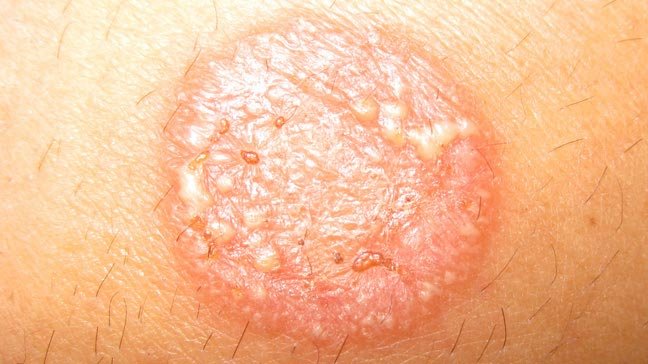
RINGWORM
Ringworm of the body (tinea corporis) is a rash caused by a fungal infection. It’s usually an itchy circular rash with clear skin in the middle. Ringworm gets its name because of its appearance. No worm is involved. Ringworm of the body is related to athlete’s foot (tinea pedis), jock itch (tinea cruris) and ringworm of the scalp ( tinea capitis). Ringworm often spreads by direct skin to skin contact with an infected person or animal. Mild ringworm often respond to antifungal medication applied to the skin. For more severe infection, you may need to take antifungal pills for several weeks.
Symptoms of Ringworm
Signs and symptoms of ringworm include;
• Ascaly ring shaped area, typically on the buttocks, trunk, arm and legs.
• Itchiness.
• A clear or scaly area inside the ring, perhaps with a scattering of bumps whose colour ranges from red on white skin to reddish , purplish, brown or grey on black and brown skin.
• Slightly raised, expanding rings.
• Around, flat patch of itchy skin.
• Overlapping rings.
Ringworm Causes
Ringworm is a contagious fungal infection caused by a common mold-like parasite that lives on the cell in the outer layer of your skin. It can be spread in the following ways;
Human to human; ringworm often spreads by direct, skin contact with an infected person.
Animal to human; you can contract ringworm by touching an animal with a ringworm. Ringworm can spread while petting or grooming dogs or cats. It’s also fairly common in cows.
• Object to humans; it’s possible for ringworm to spread by contact with an object or surface that an infected person or animal has recently touched or rubbed against, such as clothing, towels, bedding and linens, combs and brushes.
• Soil to humans; in rare cases, ringworm can be spread to humans by contact with infected soil. Infection would most likely occur only from prolonged contact with highly infected soil.
RISK FACTOR;
You are higher risk of ringworm of the body if you;
• Line in a warm climate.
• Have close contact with an infected person or animal.
• Share clothing, bedding or towels with someone who has a fungal infection.
• Participate in sports that feature skin to skin contact, such as wrestling.
• Wear bright or restrictive clothing.
• Have a weak immune system.
COMPLICATION; a fungal infection rarely spreads below the surface of the skin to cause serious illness but people with weak immune systems, such as those with HIV/AIDS, may find it difficult to get rid of the infection.
PREVENTIONS; educate yourself and others. Be aware of the risk of ringworm from infected people or pets. Tell your children about ringworm, what to watch and how to avoid infection. Keep clean and wash your hands often. Keep shared areas clean, especially in schools, child care centres, gyms and locker rooms. If you participate in contact sports, shower right after practice or a match and keep your uniform and get clean.
Stay cool and dry. Don’t wear thick clothing for long periods of time in warm, humid weather.
Avoid excessive sweating. Avoid infected animals. The infection often looks like a patch of skin where fur is missing. If you have pets or other animals, ask your veterinarian to check them for ringworm. Don’t shatter personal items. Don’t let others use your clothing, towels, hair brushes, sports gear or other personal items. And don’t borrow such things.
HOMEOPATHIC MANAGEMENT;
1. Dulcamara; best medicine for ringworm that bleeds and is in clusters. Where there is bleeding from the ringworm and they form in groups or clusters, redness of the skin all around the eruptions. The eruptions may have a yellowish scale over it.
2. Merc. sol. ; very good remedy for ringworm with burning and jerking pain. There may even be suppuration in the eruption. Scales are present all over the eruptions.
3. Sepia; ringworm that occurs every spring sea…
